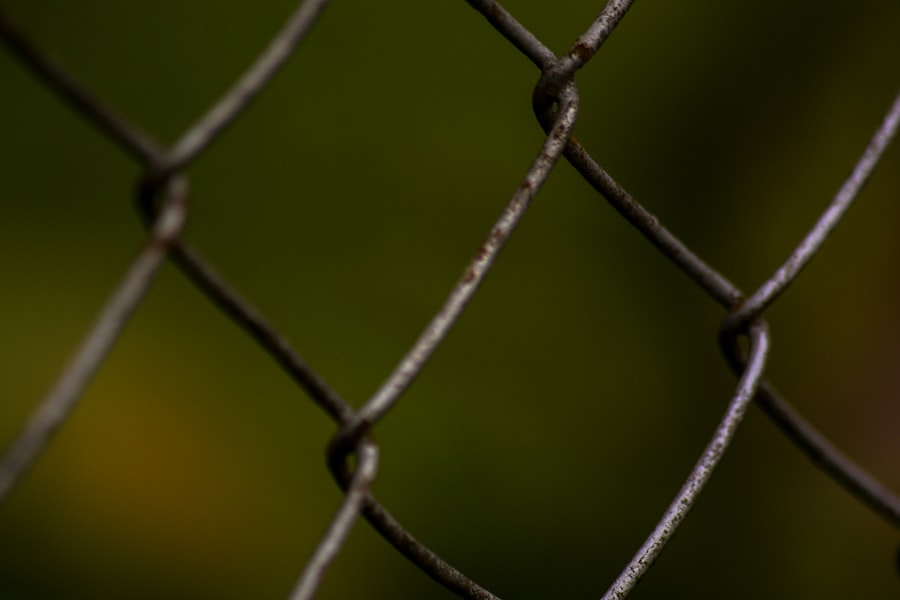Preventing chickens from perching on fences is essential for multiple reasons. Primarily, it ensures the safety of the birds, as they can easily fall and injure themselves when attempting to balance on narrow fence tops. Moreover, chickens on fences are more exposed to predators such as foxes, raccoons, and dogs, which can easily capture them.
The practice also protects the fence structure itself, as the weight of multiple chickens can cause damage or sagging, potentially leading to costly repairs. Another crucial aspect of keeping chickens off fences is containment. Chickens are known for their escape tendencies, and allowing them to perch on fences provides them with an ideal position to plan and execute escapes.
Once chickens learn they can jump over the fence, it becomes challenging to keep them within their designated area. Escaped chickens can cause problems in gardens, neighboring properties, and may face dangers such as traffic on nearby roads. By preventing fence perching, chicken owners can maintain better control over their flock’s whereabouts and ensure their safety.
Table of Contents
- 1 Methods for Keeping Chickens Off the Top of the Fence
- 2 Creating a Barrier to Prevent Chickens from Perching on the Fence
- 3 Training Chickens to Stay Off the Fence
- 4 Providing Adequate Roosting Options for Chickens
- 5 Monitoring and Correcting Behavior
- 6 Benefits of Keeping Chickens Off the Top of the Fence
- 7 FAQs
- 7.1 What are some reasons to keep chickens off the top of a fence?
- 7.2 How can I keep chickens off the top of a fence?
- 7.3 Are there any specific breeds of chickens that are less likely to perch on fences?
- 7.4 What are the potential risks of allowing chickens to perch on top of a fence?
- 7.5 Are there any legal considerations for keeping chickens off the top of a fence?
Key Takeaways
- Keeping chickens off the top of the fence is important for their safety and to prevent them from escaping.
- Methods for keeping chickens off the top of the fence include trimming their wings, using deterrents, and providing alternative roosting options.
- Creating a barrier such as adding a slanted top to the fence can prevent chickens from perching on it.
- Training chickens to stay off the fence can be done through positive reinforcement and consistent correction of behavior.
- Providing adequate roosting options such as elevated perches and comfortable coop space can discourage chickens from perching on the fence.
- Monitoring and correcting behavior is essential to ensure that chickens stay off the fence and remain safe.
- Benefits of keeping chickens off the top of the fence include reduced risk of injury, escape, and damage to property.
Methods for Keeping Chickens Off the Top of the Fence
Physical Barriers: A Simple and Effective Solution
One popular method for keeping chickens off the top of the fence is to install a physical barrier. This can be achieved by attaching strips of hardware cloth or chicken wire along the top of the fence. The barrier should extend outward at an angle to prevent chickens from perching on it. This method is effective because it physically prevents chickens from accessing the top of the fence, making it a less appealing option for them to perch. Additionally, it is a relatively inexpensive and easy solution that can be implemented quickly.
Providing Alternative Roosting Options
Another method for keeping chickens off the top of the fence is to provide alternative roosting options within their enclosure. By offering suitable roosting bars or platforms inside the coop or run, chickens are more likely to choose these designated areas over the fence. Roosting bars should be placed at varying heights to accommodate different preferences and pecking orders among the flock.
Creating Inviting Roosting Areas
Additionally, ensuring that the roosting areas are comfortable and inviting with clean bedding and adequate space will encourage chickens to roost indoors rather than on the fence. This method focuses on providing chickens with a more appealing alternative to perching on the fence, ultimately discouraging them from seeking out higher ground.
Creating a Barrier to Prevent Chickens from Perching on the Fence

Creating a physical barrier to prevent chickens from perching on the fence is an effective way to keep them grounded. One approach is to attach PVC piping along the top of the fence at an angle. The piping should be secured with brackets or clips and extend outward to create an overhang that deters chickens from landing on it.
This method is successful because it creates an unstable surface that makes it difficult for chickens to balance and perch comfortably. Additionally, PVC piping is lightweight, affordable, and weather-resistant, making it a practical option for creating a barrier on the fence. Another method for creating a barrier is to use plastic or metal spikes designed specifically to deter birds from landing on surfaces.
These spikes can be attached along the top of the fence at regular intervals to discourage chickens from perching. The spikes are harmless but create an uncomfortable surface that makes it unappealing for chickens to land on. This method is effective because it provides a clear visual deterrent without causing harm to the chickens.
Additionally, these spikes are durable and low-maintenance, making them a long-term solution for preventing chickens from perching on the fence.
Training Chickens to Stay Off the Fence
Training chickens to stay off the fence requires patience and consistency but can be achieved with positive reinforcement. One method for training chickens is to use treats as a reward for staying off the fence. Whenever chickens choose to roost in their designated areas rather than on the fence, they should be rewarded with a small treat such as mealworms or sunflower seeds.
This positive reinforcement encourages chickens to associate staying off the fence with a desirable outcome, ultimately reinforcing the behavior. Another training method is to use deterrents such as water spray or noise devices when chickens attempt to perch on the fence. By providing a negative consequence when chickens land on the fence, they will learn that it is not a desirable place to roost.
Water spray can be administered using a spray bottle or hose when chickens land on the fence, while noise devices such as motion-activated alarms can startle chickens and discourage them from perching. Consistently applying these deterrents when chickens attempt to perch on the fence will help them learn to stay grounded in their designated areas.
Providing Adequate Roosting Options for Chickens
Providing adequate roosting options for chickens is essential for keeping them off the top of the fence. Roosting bars should be installed inside the coop or run at varying heights to accommodate different preferences among the flock. The bars should be made of smooth, rounded material such as wood or PVC piping to prevent injury to the chickens’ feet.
Additionally, ensuring that there is enough space for all chickens to comfortably roost without overcrowding will encourage them to choose these designated areas over the fence. Another important aspect of providing adequate roosting options is maintaining a clean and inviting environment within the coop or run. Regularly cleaning and refreshing bedding material will ensure that roosting areas are comfortable and appealing to chickens.
Additionally, providing adequate ventilation and natural light within the coop will create a pleasant environment that encourages chickens to roost indoors rather than seeking out alternative perches such as the fence.
Monitoring and Correcting Behavior

Observing Flock Behavior
Regularly observing the flock’s behavior and identifying any instances of perching on the fence is crucial for addressing the issue promptly. By monitoring their behavior, you can identify any patterns or triggers that lead to chickens choosing the fence as a roosting spot.
Addressing Underlying Reasons
When correcting behavior, it’s important to address any underlying reasons why chickens may be choosing to perch on the fence. This could include overcrowding in the coop, lack of suitable roosting options, or environmental stressors.
Preventing Fence Perching
By addressing these underlying issues, you can help prevent chickens from seeking out alternative perches such as the fence.
Benefits of Keeping Chickens Off the Top of the Fence
Keeping chickens off the top of the fence offers several benefits for both the chickens and their owners. Firstly, it reduces the risk of injury for chickens by preventing falls from high perches. This helps maintain their overall health and well-being, reducing potential veterinary costs associated with injuries.
Additionally, keeping chickens off the top of the fence reduces their vulnerability to predators. By encouraging them to roost in designated areas within their enclosure, owners can better protect their flock from potential threats such as foxes, raccoons, and neighborhood dogs. Furthermore, preventing chickens from perching on the fence helps maintain good neighborly relations by preventing them from wandering onto neighboring properties or causing damage.
In conclusion, keeping chickens off the top of the fence is essential for their safety and well-being. By implementing effective methods such as creating barriers, providing alternative roosting options, and training chickens, owners can ensure that their flock remains safely grounded within their designated space. Monitoring behavior and addressing any underlying issues promptly will help maintain a harmonious environment for both chickens and their owners.
If you’re looking for ways to keep chickens off the top of your fence, you may also be interested in learning about the benefits of using an A-frame chicken coop. This type of coop not only provides a safe and secure space for your chickens, but it can also help prevent them from wandering onto your fence. Check out this article on A-frame chicken coops to learn more about this practical solution for keeping your chickens contained.
FAQs
What are some reasons to keep chickens off the top of a fence?
Chickens on top of a fence can pose a safety risk to themselves and others, can damage the fence, and may escape from the enclosure.
How can I keep chickens off the top of a fence?
You can use deterrents such as angled barriers, netting, or wire mesh to prevent chickens from perching on the top of a fence.
Are there any specific breeds of chickens that are less likely to perch on fences?
Some breeds, such as heavier breeds like Orpingtons or Cochins, are less likely to fly and perch on fences compared to lighter, more flighty breeds.
What are the potential risks of allowing chickens to perch on top of a fence?
Chickens perching on top of a fence can be at risk of predators, injury from falling, and may also cause damage to the fence itself.
Are there any legal considerations for keeping chickens off the top of a fence?
Local ordinances and regulations may dictate the height and type of fencing required for keeping chickens, so it’s important to check with local authorities before making any modifications.
Meet Walter, the feathered-friend fanatic of Florida! Nestled in the sunshine state, Walter struts through life with his feathered companions, clucking his way to happiness. With a coop that’s fancier than a five-star hotel, he’s the Don Juan of the chicken world. When he’s not teaching his hens to do the cha-cha, you’ll find him in a heated debate with his prized rooster, Sir Clucks-a-Lot. Walter’s poultry passion is no yolk; he’s the sunny-side-up guy you never knew you needed in your flock of friends!







